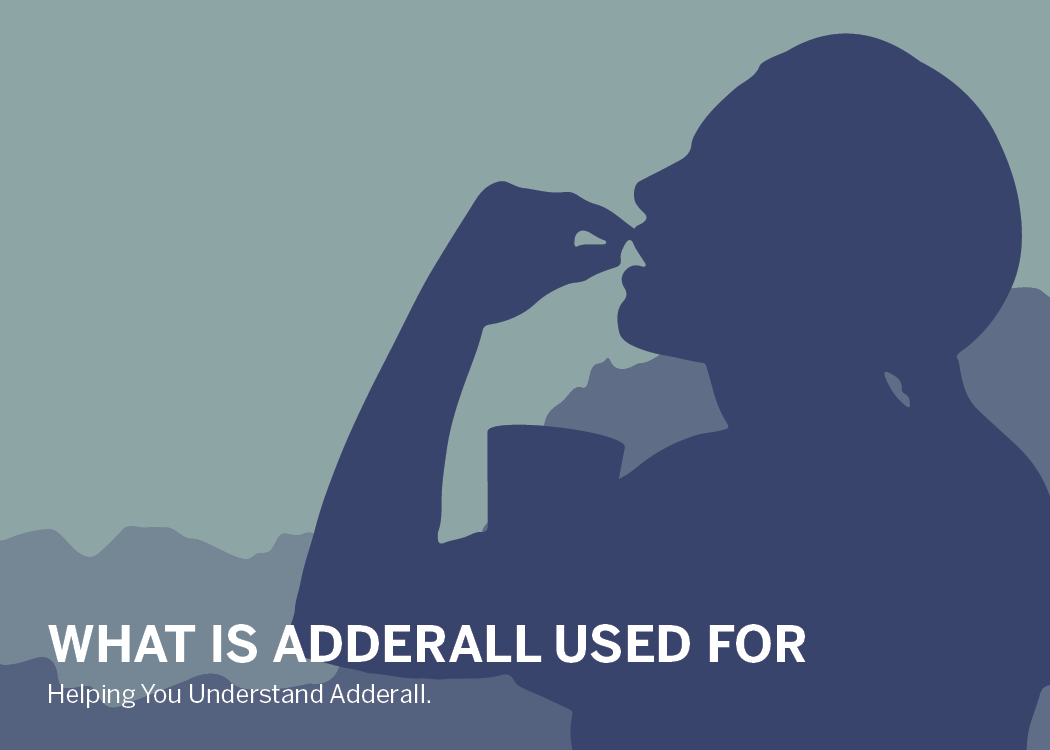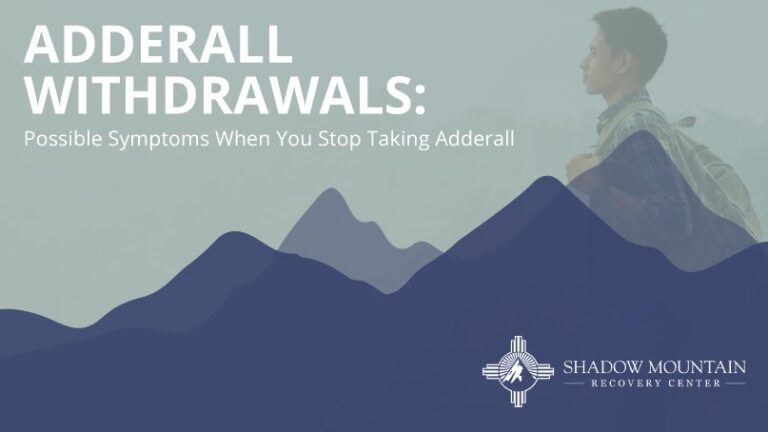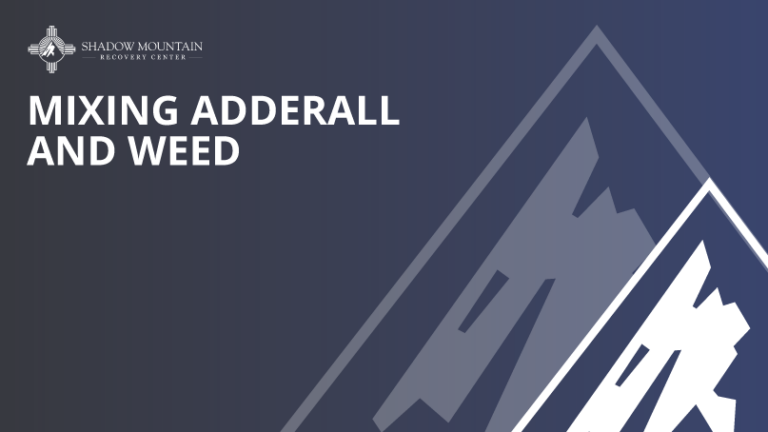Helping You Understand Adderall

It wouldn’t be too shocking if you’ve heard of Adderall from someone other than a doctor. Maybe you were having trouble staying awake in school, or at your job, and someone told you “I can help!”
Or maybe it was close to finals and you were very nervous about passing your tests. Studying harder and making sure you could stay focused was on your mind and a friend said, “I know exactly how you can stay focused and for longer!”
What is Adderall?
Adderall is a brand name for the compound drug Dextroamphetamine, which is typically taken orally. It is a central nervous system stimulant and is classified by the Drug Enforcement Agency (DEA) as a Schedule II controlled substance, which is further defined as, “…drugs with a high potential for [misuse], with use potentially leading to severe psychological or physical dependence.”
Who Is Adderall Prescribed For?
Adderall is prescribed to treat Attention Deficit Hyperactivity Disorder (ADHD) and Narcolepsy. The CDC says ADHD is “one of the most common neurodevelopmental disorders of childhood,” but can also last into adulthood as well. They define it as characterized by “…having trouble paying attention, controlling impulsive behaviors (may act without thinking about what the result will be), or be overly active.”
The truth is, though, a lot of those symptoms can be signs of quite a few other diagnoses, and the only way to know for sure what your child (or you) may be dealing with is to visit a licensed professional.
Your best bet is to schedule an appointment with a physician and get a diagnosis. Doctors may have you complete a checklist for what symptoms are of ADHD are present, or maybe even have you track symptoms over a period of time, like a month or so.
More information about how children and adults are diagnosed with ADHD is available here, as well as through the Children and Adults with Attention-Deficit/Hyperactivity Disorder (CHADD) program, which is supported by the CDC.
Narcolepsy is defined by the Mayo Clinic as “a chronic sleep disorder characterized by overwhelming daytime drowsiness and sudden attacks of sleep.” Plenty of people feel sleepy throughout the day, and maybe you’re even yawning right now. That doesn’t mean you have Narcolepsy!
One of the most telling symptoms of narcolepsy is suddenly falling asleep and not being able to stop yourself. It can happen while driving, eating — at any time. Other symptoms include sudden loss of muscle tone, called Cataplexy; sleep paralysis; and hallucinations. All of these symptoms will differ from person to person, and just like ADHD, a diagnosis from your doctor is the best way to find out what’s going on.
Prescriptions of Adderall to treat narcolepsy and ADHD are very normal. When the drug is used properly it can be incredibly helpful and offer comfort to people who are struggling with those specific diagnoses.
Used For Treatment of Many Diagnoses
You can even read here how Adderall is used safely and in conjunction with other treatments to help Julie with her narcolepsy. In her case Adderall was prescribed for a very specific and incurable condition. It’s just one of the ways you can see that this medication is not all bad.
Similarly, Chris Guillebeau wrote about being diagnosed with ADHD as a child and going many, many years with no medication. He was prescribed Adderall in his 30s and began taking it safely and as indicated by a doctor.
He only writes about his experience and has described it as going very well. Because he received a diagnosis of ADHD and was given the medication by a doctor, it helped him navigate the struggles of living with an attention disorder.
Adderall Addiction Can Lead to Depression and Other Symptoms
Adderall is not bad when taken appropriately, for true medical conditions. Doctors always want to take the side effects into account when prescribing a medication and specifically confront the question of how much the medication will help.
Eric Grayson, PharmD said, “We have to ask ourselves, ‘Are the benefits we’re getting from the medication worth the risk of side effects?’” It’s an important question not just for the doctors to ask.
What exactly are the potential side effects of Adderall? There are quite a few, ranging from minor to severe, and some even potentially life-threatening if the medication is not taken as prescribed by your provider.
Side effects can include:
- nervousness
- headache
- changes in sex drive or ability
- painful menstrual cramps
- dry mouth
- Constipation or diarrhea
- nausea
- weight loss
Serious side effects include, but aren’t limited to slow or difficult speech, dizziness, weak/numb arm or leg, grinding your teeth, feelings of agitation or paranoia, and even hallucination, mania, swelling of the eyes and other parts of the face, paleness or blue coloring to the fingers or toes, and more.
If you experience any of these reach out to a doctor or care team immediately.
How Long Does Adderall Stay in Your System?
Adderall is an immediate-release tablet prescribed to be taken between four and six hours apart, two to three times daily, although there is an extended-release tablet available as well, usually taken after waking up.
According to a study from the National Center for Biotechnology Information, Adderall is detectable in blood for nearly three days. The same study shows that Adderall can be found in urine tests up to 72 hours after taking a single dose, and specifies it is also detectable for nearly 10 days in those who take it regularly.
How Does Adderall Affect Your Body?
When prescribed for those with ADHD or hyperactive-impulsive or inattentive symptoms the effect is to lessen the feeling of needing stimulation their brain is dealing with due to the ADHD.Adderall, essentially, tells their brain, “You have the stimulation you need, so no need to go searching for it,” allowing them to feel calmer.
For anyone with Narcolepsy the drug acts as a stimulant helping them to stay awake. It does both of these by affecting certain brain chemicals.
Texas A&M Health says, “Adderall is a combination of two central nervous system (CNS) stimulants, amphetamine and dextroamphetamine. When these get to the brain, they act like the naturally occurring neurotransmitters dopamine, epinephrine (also known as adrenaline), and norepinephrine.”
Dopamine is released in the reward center of the brain and is often found at lower levels in those diagnosed with ADHD. Since Adderall stimulates the release of dopamine, a person with ADHD feels stimulated and won’t feel the need to constantly seek stimulation. Likewise, someone diagnosed with Narcolepsy is stimulated and moves through the day without falling asleep.
Is Adderall an Addictive Medication?
The easy answer is yes, but there’s more to it than a simple yes. MedLine Plus warns that Adderall can be habit-forming and says taking a larger dose than prescribed or for longer than prescribed can lead to feeling “a need to take large amounts of the medication…”, and potentially seeing drastic changes in your behavior.
In 2019, New Mexico had over 900 people admitted, or just over 14% of their state total for alcohol or substance misuse treatment.
A study by the Journal of the American Academy of Child and Adolescent Psychiatry detailed the use of non prescribed stimulants for 113,104 people, stating “reported rates of past year, stimulant use to range from 5% to 9% in grade school- and high school-age children and 5% to 35% in college-age individuals.”
Those studies also indicated a higher risk of diversion and misuse of stimulants for those diagnosed with ADHD symptoms. The studies also showed “[l]ifetime rates of diversion ranged from 16% to 29% of students with stimulant prescriptions asked to give, sell, or trade their medications.”
Help, Am I Addicted to Adderall?
Addiction can have many stages and differ for each person, but there are definite signs to look out for. The Mayo Clinic defines addiction as “an inability to control the use of a legal or illegal drug or medication.” If you are taking Adderall with or without a prescription and feel you cannot stop, or as if you cannot maintain your day-to-day life without it, you may need to detox from adderall.
Other symptoms include struggling to meet your obligations socially or for work, spending money on the drug rather than on necessities, and the inability to block thoughts of obtaining and taking the substance.
If you or someone you know is or may be experiencing these symptoms, please give us a call. Shadow Mountain specializes in holistic, evidence-based treatment at all of our spiritually neutral locations. Finding your way to long-term recovery can be incredibly difficult, but you don’t have to do it alone. Give us a call at 505-657-2117 and let’s start your recovery today.





